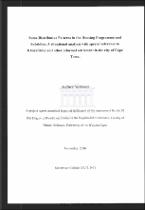Some Distributive Patterns in the Housing Programme and Subsidies: A situational analysis with special reference to Khayelitsha and other informal settlement in the city of Cape Town.
Abstract
The study provides a situational analysis of some distributive patterns in the housing programme and subsidies. The overall research question revolved around the extent to which the post-apartheid housing policy responds to issues of establishing integrated sustainable human settlement. The methodology of the study outlined different instruments, public records, and reports at the local level, survey of housing applicants in the concerned communities. Basic indicators were developed to perform the assessment of the policy, outcomes achieved so far, structures to identify institutional problem affecting the process of policy implementation, and in final analysis, to collect the view
points of effective and potential beneficiaries of housing programmes subsidies. The case of Khayelitsha examined in the study is a strong illustration of the magnitude of problems associated with housing delivery in disadvantaged areas. These problems are multidimensional and reflect in the overall, poverty context in which people live. Some indications from the policy implementation suggest substantial progress and significant outcomes in regard to the provision of housing subsidies in the poor communities. Although the housing subsidies programme, is part of the growing effort deployed by the governments of South Africa in new dispensation have produced positive outcomes. The survey collected from the applicant and beneficiaries, however, indicated that there are different views in regard to the process of housing delivery. Some beneficiaries praised the government for the houses allocated to them and which gives them some kind of
dignity. Whereas those on the waiting list expressed their discontentment regarding the process. Overall, the survey reveals that people benefited from the policy, despite the structural deficiencies (lack of communication sometimes), and political collisions affecting the policy implementation process. Appropriately in line with this study, suggestions were propose regarding ways of improving the housing policy delivery.

